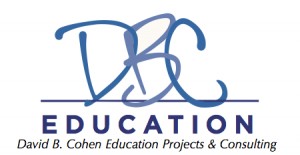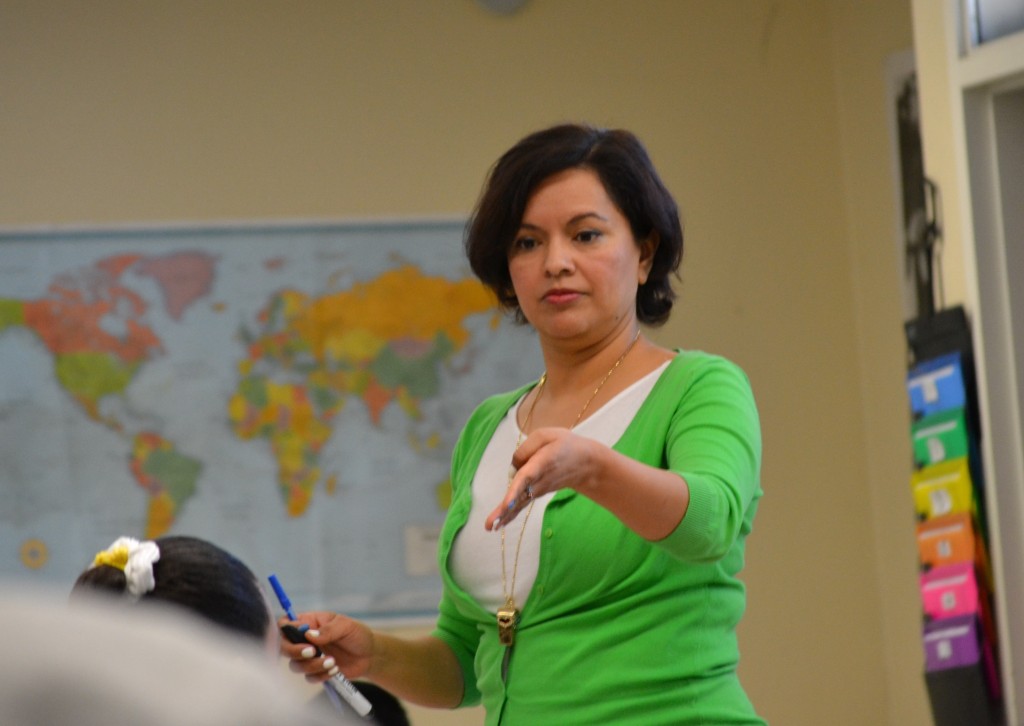This post originally appeared as “The Perfect Person for Imperfect Circumstances” on my EdWeek Teacher blog, Road Trips in Education, on March 18, 2015.
My friend and colleague Martha Infante brought me over to meet her assistant principal prior to the start of the school day at Los Angeles Academy Middle School (LAAMS). After signing in and picking up my official yellow LAUSD “Visitor” sticker, I told him about my project, spending the school year observing and writing about the good in California public education. Like so many educators I’ve met along the way, he expressed gratitude that someone would do that, considering how much negativity attaches to discussions of public education these days. He mentioned his love of the school and the community, noted that Martha shares that commitment, and wished that policy makers could see and understand what’s really happening in schools that they talk about fixing without knowing how.
Then he asked, “How long are you staying?” I told him I was there for the full day, and then he laughed and said, “Well I’ll come find you at the end of the day and see what you think!”
Sure enough, as the last students departed from Martha’s classroom at the end of the instructional day (and before the first of a few meetings in Martha’s afternoon), the assistant principal was there to check on me. “Oh, he got the full experience today!” Martha said on my behalf.
I think the question about what I’d think at the end of the day and the reference to “the full experience” hinted at both the challenges and the commitment present at the school. My admiration for Martha was a given, the reason that I was there in the first place. I didn’t even need to show up on campus to know her commitment to her students and the community, to educational equity and excellence, and to state-level leadership in social studies education and teaching quality. But Martha and her assistant principal both knew that if I spent six hours at the school, I was going to see the challenges as well. The National Board Certification and outside activities and accolades may indicate the depth of Martha’s knowledge and commitment, but they aren’t sufficient to meet the considerable needs of all the students at her school, day after day, year after year. Daily successes only buy another day of intense efforts battling the same long odds.
The challenges I observed directly and indirectly were not surprising, are not unique to LAAMS, and I’m not going to narrate my day in this post. (Don’t let your imagination get carried away, though; there was very little drama in the classroom). The story is similar in too many American communities and public schools, and is often told in terms of deficits: poverty, violence, incarceration, homelessness, disability, lack of health care (including mental health services). And while I choose not to focus on these problems here, I think it’s essential to reaffirm that they do have a powerful impact on students’ lives and learning.
But it would be against the grain of my work this year to focus on deficits at LAAMS or any other high-poverty school I’ve visited. The assistant principal, and even Martha, may have thought that I would mainly see the problems, perhaps because they are continually focused on addressing those issues, or perhaps because there’s something about human psychology that allots disproportionate attention to negative experiences.
Instead, I took note of the strong majority of students giving their best focus and attention to their work in every class I observed; and when they were called upon to share their work, they were showing a good start to acquiring new knowledge of facts and relationships. I saw how students gravitated to Martha’s classroom during breaks and at lunch. I observed how much effort Martha and her students have put into fundraising for school-sponsored trips to Washington, D.C., New York, and China. I’ll remember the students who took an interest in my work and thanked me for visiting, and the girl who sang for her peers at lunch, giving them a preview of what’s to come when she competes in a Spanish television version of “The Voice” for child or teen contestants.
I saw how Martha demonstrated her understanding of students, their families and culture, in order to make something as remote as the Black Death accessible to today’s middle schoolers. I noted how she used her bilingual fluency to support the learning of her students, and how even-mannered she remained even when challenges arose. I wondered if she would resort to negative consequences for a student who didn’t respond to multiple attempts to improve his focus and work, and then I saw her patience pay off when she was instead praising his self-control later, speaking with this seventh-grade boy individually after class to try to help him recognize what led him to do the right thing.
By day’s end, over the course of six hours, of course I had seen some of the challenges in classes or the school, and Martha began to talk to me with a focus on what hadn’t gone well. I told her that from what I’d seen, she might be the perfect person to handle an imperfect situation.
Now, this imperfect situation is not a chance occurence, but rather, a creation of people, the result of many intersecting decisions and policies over many years. I’m not talking about school decisions and school policies, but rather those that have shaped the school and its community, leaving both to face tougher challenges with fewer resources. From those who look at education from the outside and would like to see schools and teachers do a better job, it seems like I often hear about what those people need to do – people like Martha Infante, her colleagues, and students. There’s an implication that desire, and personal sacrifice, can replace the stability and resources we provide elsewhere because we know they make a difference for students’ learning and well-being. Too many people accept the structural problems as given (“well, we can’t raise taxes…”), and then proceed to turn up the pressure on educators to compensate for our collective inertia around necessary, fundamental changes in society.
You won’t improve schools by keeping administrators and staff guessing every year about shifts in governance, funding, madates, resources, programs, data and accountability systems.
You won’t squeeze any better teaching out of dedicated educators by publicly treating them as the source of the problem – or even as the solution, if you stop at praise.
Instead, show educators and students more respect. They need much more than the right beliefs and the right mindset. Don’t ask schools, students, or teachers to rise to your expectations of excellence if you aren’t just as deep in the fight for their expectation of equity.


Nice post, David. I think some of the problems you’re noticing in low-income schools are present in high-income schools, too. I think they manifest themselves in different ways, but the uniting factor is really this idea of respect.
I worked in an affluent area in Chicago, and many of the families I had the pleasure of working with were outstanding people. I feel so lucky that I had the chance to partner with them while their children went through my classroom. But throughout my four-year tenure there, I noticed some significant changes in the administration, specific in it’s respect towards teacher autonomy and trust. Overall, I think it has led to a downward trend in that district, especially in terms of teacher attrition.
Thanks for the thought provoking post.
P
Thanks for reading and commenting Paul. You’re right in suggesting that some of challenges in high and low SES schools are similar, though the outward appearances and concentrations of the problems are different, along with the resources that can be dedicated to addressing those problems. It seems to me that a society that fails to allocate resources to mitigate problems is sending a message that we’re actually indifferent regarding the eventual outcome.